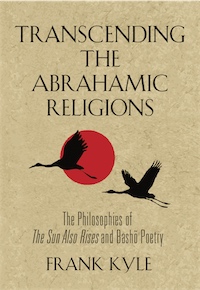| ||||||||||||||||
| Category: Philosophy |
(requires Adobe Reader)
|
| About the Book | |
|
The Sun Also Rises invites the reader to embark on a philosophical journey. The journey was initiated by World War I. Because of the war, the story’s protagonist, Jake Barnes, suffers an injury that prevents him from having sexual relationship with the woman he loves, thus preventing them from fully realizing their relationship as a couple. The tragedy of the war apparently invalidated for Jake the Grand Narrative of Christianity that clearly played an important part in his life before the war. Jake is a member of the post-war “lost generation” caught up in a profligate, discordant way of life. Unlike his friends, however, Jake seeks an alternative philosophy of life that offers other sources of meaning. It is through Jake’s philosophical quest that the novel does more than present the post-Grand Narrative condition and the postmodern culture it produced. It suggests an alternative worldview that is not only meaningful but really is the only authentic life-enhancing option for humanity. In doing so, the novel introduces the ontology, ethics, and aesthetics of this worldview. What the haiku poet Matsuo Basho; reveals is a form of love that is universal yet personal. It expresses a sympathetic rather than a romantic relationship between the perceiver and the perceived. His love of the world is heartfelt and spiritual. His poetry reveals a worldview that gives humanity a unique and essential cosmic role to play. There is a purity to Basho’s poems that is rare in literature. If The Sun Also Rises begins the philosophical journey to answer the question of what worldview offers human beings the most meaningful and unique form of self-realization, Basho’s poetry and life are the journey’s destination. The readers of Transcending the Abrahamic Religions: The Philosophies of The Sun Also Rises and Basho Poetry will embark on an intellectual odyssey that will introduce them to Judaism, Christianity, Islam, Buddhism, Taoism, the scientific worldview, philosophy of religion, ethics, aesthetics, logic, epistemology, philosophy of language, phenomenology, existentialism, and rhetoric. Their final destination will be a worldview that is true, humane, and meaningful.
|
|
| Reviews | |
Among works attempting to appropriate Hemingway for extraliterary purposes, none was more determined or provocative than Frank Kyle’s (1995) Hemingway and the Post-Narrative Condition: An Unauthorized Commentary on “The Sun Also Rises”. Kyle argued that Hemingway’s novel was perhaps the first postnarrative work of fiction—narrative in this case referring to the Grand Narratives that have traditionally been the foundation for explaining the meaning of life in Western societies. Asserting that the First World War effectively erased the efficacy of Grand Narratives often expressed in myth, religion, and literature, Kyle argued that in The Sun Also Rises Hemingway explored the “philosophical and psychological implications” of the loss of narrative as a controlling ideology for existence. Kyle’s book is steeped in philosophical commentary on the ultimate meaning of the experiences undergone by Hemingway’s characters. In Kyle’s estimation, Hemingway was not simply a great modern; he was the first postmodern American novelist as well. Published in The Critics and Hemingway, 1924-2014: Shaping an American Literary Icon
|
|
| Related Titles | |
|
|
| About the Author | |
 |
Frank Kyle received his doctorate in English from the University of Northern Colorado and holds graduate degrees in philosophy and psychology. He has published a number of books--fiction, nonfiction, and poetry. He lives in France with his wife Brigitte. |

